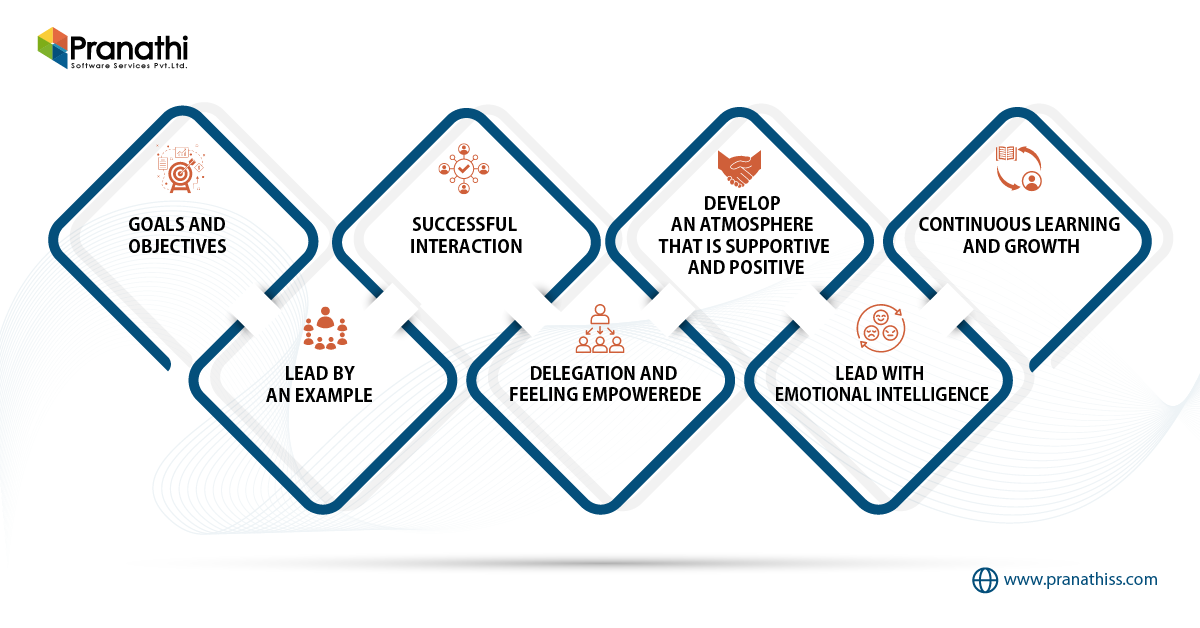The Secret of Success is an Effective Leadership

4 min read
Introduction
Effective leadership has long been studied and admired. Leaders who inspired their teams to greatness throughout history have forever altered the course of human history. However, what are the formulas for their success?
This blog will examine the essential qualities and methods that enable leaders to motivate followers to realize their full potential.
Here are Few Points to be Considered before analyzing Effective Leadership Qualities
1. Goals and Objectives
A distinct vision and mission are among the most essential requirements for effective leadership. A strong leader can articulate a vision for the future that is both compelling and motivating. The team can proceed in the direction this vision indicates, which acts as a compass. A leader can enliven passion and enthusiasm by connecting the team’s efforts with a meaningful purpose and guiding everyone toward a common objective.
Work is meaningful when it has a purpose. A leader who highlights the bigger goal driving their team’s efforts can encourage community and pride among team members. People are motivated to work harder and maintain their commitment, even in trying circumstances, when they know their work significantly contributes.
2. Lead by an Example
Effective leadership relies on the maxim “lead by example.” A leader earns respect and admiration by modeling the behaviors they want from their team. They set an example for their team by exhibiting commitment, dedication, and integrity. As a result, a culture of accountability is established, and followers are inspired to imitate the leader. Authenticity in leadership is also crucial. Genuine and open leaders captivate their followers. It can be more effective for leaders and their team members to connect when they share personal experiences of overcoming obstacles and showing vulnerability.
3. Successful Interaction
Every successful relationship between leaders and their teams is built on communication. An effective communicator who speaks clearly and listens intently is a motivating leader. To compel and motivate their followers, they persuasively communicate their vision. Regular, honest communication keeps everyone on the same page and builds trust.
Equally crucial is active listening. A leader who pays attention to their team members shows empathy and respect. Leaders can better address problems and make wiser decisions when they know the team’s worries, suggestions, and feedback.
4. Delegation and Feeling Empowered
Influential leaders are aware of the importance of delegation and empowerment. They assign tasks that align with each team member’s strengths and potential while considering their knowledge and experience. Delegating tasks allows team members to take ownership of their work and advance in their positions while also lightening the workload of the team leader. Employees who feel empowered are more motivated and likely to contribute significantly to the organization’s success. Delegation and empowerment go hand in hand. Leaders build an engaged and motivated workforce by distributing tasks and responsibilities to team members based on their strengths and interests. Additionally, delegation promotes a learning and growth culture and frees leaders to concentrate on strategic issues.
5. Develop an Atmosphere that is Supportive and Positive
Inspiring leaders produce positive and encouraging work environments. They promote a culture of cooperation and respect and value the health of their team members. A motivated and devoted team is created by recognizing and celebrating accomplishments, providing helpful criticism, and supporting each other during trying times. Celebrating and acknowledging accomplishments of all sizes lifts spirits and inspires continued excellence. Individuals can develop their skills, and team performance is improved with the help of constructive criticism that is empathetic and respectful.
6. Lead with Emotional Intelligence
Successful leadership requires a variety of qualities, including emotional intelligence. Leaders who can comprehend and control their emotions can handle challenging situations empathetically and calmly. They also acknowledge and respect the feelings of their team members, which promotes a sense of unity and allegiance. Effective emotion management is a leadership skill that helps teams work together to solve problems and become stronger. The needs and emotions of their team members are on the minds of empathic leaders. Leaders can offer the proper support and encouragement to help people overcome obstacles and perform at their best by recognizing and acknowledging emotions.
7. Continuous Learning and Growth
Growing and developing as a leader is a lifelong process. Motivating leaders are dedicated to lifelong learning and actively seek opportunities to increase their skill set. They support a culture of development and improvement within the company by encouraging their team members to follow suit.
The primary ability to become a leader is to accept yourself.
Being a leader means modeling behavior for others and acting with integrity.
You can only expect others to see you as a leader if you believe in yourself. The ability to rely on oneself is a leader’s greatest asset; if you doubt your abilities, leadership is not the activity for you. No matter how talented you are, if you doubt your ability to lead, you give your doubts strength.
Self-esteem is the most critical factor in determining success. Develop these personality traits to begin your leadership journey, along with confidence:
- Belief in oneself
- Crystal-clear thinking/Logical thinking
- Recognition
- Team-building abilities
You will advance up the leadership ladder faster than others once you incorporate these four major skills into your personality.
Conclusion
Successful leaders throughout history have mastered the art of inspiring others to greatness. These leaders create a compelling force that catapults their organizations to new heights by having a clear vision and purpose, setting a good example, communicating, empowering their teams, cultivating a positive environment, and utilizing emotional intelligence.
Aspiring leaders can use these techniques to realize their full potential and motivate others to excel. By doing this, they can forge a legacy that will last well after their leadership tenure. Remember that effective leadership involves inspiring others to work together to accomplish great things rather than merely commanding them.
In summary, motivating others to achieve greatness is a complex process that calls for a blend of vision, effective communication, emotional intelligence, empowerment, and ongoing personal development. When leaders exhibit these qualities and behaviors, they can foster a productive environment that inspires their team to succeed. For AI and ML services, you can dive into our blog sections.
Published: July 21st, 2023

